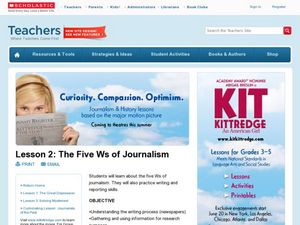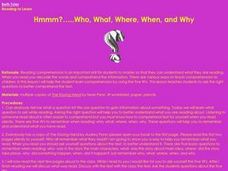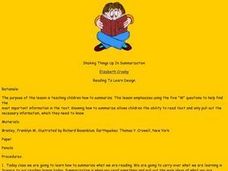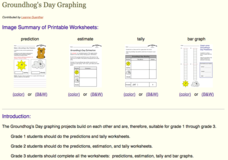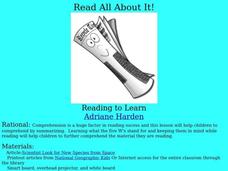Curated OER
The 5 W's of Reading
Primary young scholars will use the five "W" questions for reading comprehension as they read silently to themselves so that they can understand and remember what they have read. They then read The Velveteen Rabbit aloud, discussing the...
Curated OER
Build Masters: Identifying Details
Find key details in books using this note card strategy. Each reader gets six cards with the classic who, what, where, when, why, and how detail prompts. After they read the book, they choose a card and locate a key detail...
Nosapo
Family Titles, Pronouns, Writing about a Person
How is your grandmother related to you? How is your cousin related to your grandmother? Learn about family relationships and pronouns with an activity that guides pupils to write two short narratives about members of their families.
Curated OER
The Five Ws of Journalism
Students write a mock article. In this journalism lesson, students define the word "article" and learn the five W's of article writing. Students complete a worksheet and write a paragraph using what they have learned.
Curated OER
5 W's and H
Young scholars explore the 5W's and H of journalistic writing. In this 5 W's and H lesson plan, students read two articles from a newspaper and locate the 5 W's and H in the articles.
Curated OER
Sum It Up !!
Students practice various comprehension strategies to generate the main idea of the text. They encounter unfamiliar concepts and new vocabulary in their quest of the main idea in "Watson's Goes to Burmingham." The Five W's (What, Where,...
Curated OER
Hmmm...Who, What, Where, When, and Why
Young scholars practice reading comprehension by answering the 5 "W" questions. After reading "The Kissing Hand," they complete a class discussion addressing the questions who, what, when, where, and why. Students choose an...
Curated OER
Reading Articles for Meaning
Third graders read and analyze an article. In this interpretation and summarizing lesson, 3rd graders listen to an article and identify the who, what, where, when and why of the article. Students pick their own article,...
Curated OER
Sentence Combining
After a demonstration by the teacher of how to combine sentences, groups read a story loaded with short, choppy sentences and work together to combine sentences to create a more interesting tale. They record their version on a...
Curated OER
Shaking Things Up In Summarization
Students practice several techniques and strategies to become better at summarizing a piece of writing. They emphasize the five "W's: who, what, where, when and why. A book of Earthquakes is read and then summarized by each of the students.
Curated OER
Summarization
Pupils summarize a selected piece of text using the five Ws. After reviewing the correct way to read silently, students read a selected piece of nonfiction text. They write a summary paragraph using a process outlined by the instructor.
Curated OER
Summarization Safari
Young scholars summarize a piece of fiction text. After reviewing the correct way to question while reading, students independently read a short story. They complete a summary organizer using the five Ws outlined by the instructor during...
Curated OER
Where are the Famous Women in History?
Students investigate sexism in history by identifying important women from the U.S. In this women's equality lesson, students discuss why they remember more men in the history of the U.S. than women. Students compare women's...
Curated OER
Living Longer
Students relate health information text to themselves and society. In this health information lesson, students answer questions using the 5 W's based on the health issue they are reading about. Students discuss life...
Kid Zone
Groundhog's Day Graphing
This Groundhog's Day, challenge scholars to predict, estimate, tally, and graph in a weather-themed lesson in which class members play the role of the groundhog to forecast the weather come February second.
Curated OER
Read All About It!
Students are taught the comprehensions aids them in their reading and will make reading seem easier once they know what they are reading about. They access how th ask themselves the five W's: who, what, where, when, and why. Students by...
Curated OER
P a g e - b y - P a g e
Middle schoolers discuss the writing process and take notes on the five steps and how they can be used in other subjects. They examine a newspaper article and after reading it they identify the five W's and H. They brainstorm to come...
Curated OER
Five Big W's
Students develop summarization strategies by asking themselves questions as they read. They devlop these strategies help them develop better comprehension. Students goals for reading is comprehension. They explore helpful...
Curated OER
Shopping!!!
Learners explore money management. In this financial awareness lesson, students are given an amount of money and a sheet of objects to choose from to buy. Learners choose only five objects they can afford to "buy."
Curated OER
ESOL Recognize Basic Questions
Students review information questions with who, what, when and where. They orally practice answering questions as a class then work in pairs to practice all questions and answers orally.
Curated OER
Shopping
Fifth graders simulate a shopping experience. Students are given a specified amount of money and they must spend it. Students choose five items they wish to purchase and determine if they can afford the items.
Humanities Texas
Primary Source Worksheet: Frederick Douglass, “Expression of Gratitude for Freedom”
Here is a fantastic primary source analysis activity regarding Frederick Douglass' speech delivered at the unveiling of the Freedmen's Monument in 1876. The follow-up discussion questions and activities highlight Douglass' discussion of...
Curated OER
Writing a Number Sentence
Third graders analyze word problems. In this number sentence lesson, 3rd graders evaluate word problems. Students create number sentences from word problems.
Curated OER
Finding Total Given Part and Percentage
Learners observe models of fractional parts. After writing the definitions of percent, part and whole, students use the calculators and computers to solve problems. Individually, they complete assigned problems where the convert the...



